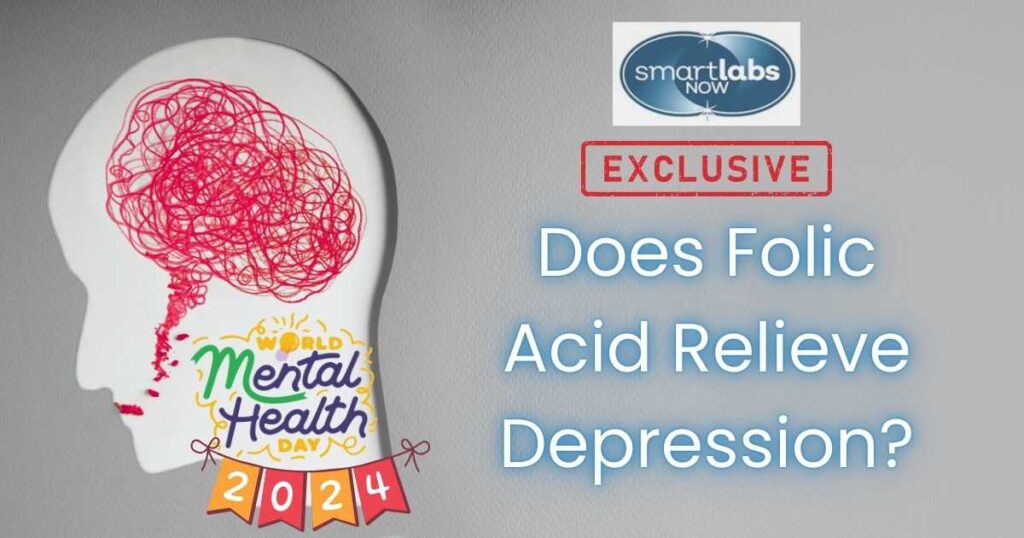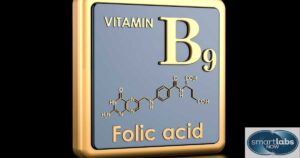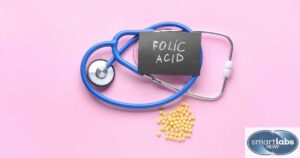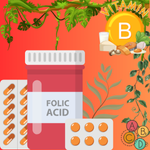
Depression is a widespread mental health disorder that affects millions worldwide, with many individuals searching for alternative and complementary treatments beyond conventional antidepressants. One such option that has garnered attention is folic acid (vitamin B9/folate) and its derivatives, which may help alleviate depressive symptoms.
This article will explore the connection between folic acid and depression, focusing on its efficacy, different formulations, clinical considerations, and safety in supplementation.
In the giving spirit of World Mental Health Day 2024, we’ve added authoritative, linked citations along with every supplement claim 🤓 – feel free to open these pages separately to review the literature.
And if you want to jump straight to testing, schedule here 👇:

Folic acid deficiency can arise from several causes, each carrying significant health risks.
A prominent effect of this deficiency is megaloblastic anemia, where the body produces unusually large, immature red blood cells that hinder oxygen transport. Vitamin B12 deficiency can worsen this form of anemia since folic acid and B12 work closely together in red blood cell production. Without sufficient folic acid, individuals are at higher risk of severe fatigue and weakness due to anemia.
Certain conditions, such as celiac disease and inflammatory bowel disease, impair the intestines, reducing folic acid absorption. With compromised absorption, individuals may experience ongoing folic acid depletion, leading to further health risks. Moreover, some medications can interfere with folic acid metabolism. For example, methotrexate, used in treating autoimmune diseases, and oral contraceptives can reduce folic acid availability in the body, potentially lowering folic acid levels over time.
Increased folic acid needs during pregnancy make deficiency even more concerning, as it raises the risk of neural tube defects in the developing fetus. Patients on total parenteral nutrition—those receiving nutrients intravenously—also risk folic acid deficiency if the nutrient is not adequately included in their formulation. Deficiency can impact cognitive health, potentially resulting in central nervous system damage, especially when levels are severely low.
Recognizing and addressing folic acid deficiency early can prevent these critical health issues.

Folic acid plays a vital role in supporting mental health during pregnancy, with research linking it to a reduced risk of perinatal depression.
Depression experienced during or after pregnancy is commonly measured using the Edinburgh Postnatal Depression Scale, which assesses the severity of depressive symptoms. Research suggests that genetic factors like the MTHFR c677t polymorphism can impair folic acid conversion to l-methylfolate, the active form that supports neurotransmitter production, critical for mood stability. This genetic mutation can increase the risk of depressive symptoms in individuals with low folate levels.
For those in high-risk ethnic groups where the prevalence of this mutation is higher, targeted folic acid supplementation or direct l-methyl folate intake can offer mental health benefits. Supplementation helps ensure sufficient folate levels to support neurotransmitter synthesis, particularly in at-risk groups. Pregnant individuals can benefit from prenatal vitamins with folic acid, as they support both the mother’s mental health and fetal development, reducing the chance of neural tube defects.
Folate deficiency can impact the brain’s ability to produce neurotransmitters like serotonin, which regulate mood, further linking low folic acid levels to perinatal depression. Through appropriate supplementation, individuals can help minimize these mental health risks, promoting a healthier pregnancy and postpartum period.

Folate’s role in depression has been the subject of extensive research. Evidence suggests that folate supplementation can influence depressive symptoms, particularly for individuals with specific biochemical deficiencies or resistant depression.
Folate acts as a crucial antioxidant in the brain. By reducing oxidative stress, it protects neural tissues from damage, which is often linked to depressive symptoms. Antioxidants, including folate, help neutralize free radicals, protecting the brain from the detrimental effects of chronic stress and inflammation.
These mechanisms are especially relevant in cases of depression, where oxidative stress has been implicated as a key factor.
Folate is often used as an adjunctive therapy in individuals with treatment-resistant depression, especially those unresponsive to traditional antidepressants like fluoxetine. Studies show that folate can enhance the efficacy of selective serotonin reuptake inhibitors (SSRIs), providing greater relief for patients when taken in combination with antidepressants.
Folate is essential for maintaining the integrity of the blood-brain barrier, a structure that protects the brain from harmful substances. The active form of folate, 5-methyltetrahydrofolate (5-MTHF), easily crosses this barrier, directly supporting neurotransmitter synthesis and other vital cognitive functions.
Folate plays a critical role in cognitive function, impacting memory, attention, and decision-making—areas often affected in individuals with depression. Low folate levels are linked to cognitive symptoms like confusion and poor concentration, which may worsen the overall depressive experience.
For individuals resistant to fluoxetine (a common SSRI), folate supplementation has shown promise in reducing depressive symptoms. By regulating serotonin production and facilitating the methylation cycle, folate can improve the response to fluoxetine and similar medications.
Folate deficiency is prevalent in people with major depressive disorder (MDD), particularly in populations with poor dietary intake of folate-rich foods like leafy greens and legumes. The deficiency can lead to elevated serum homocysteine concentrations, which have been linked to increased risk for depression. Research shows that higher homocysteine levels correlate with more severe depressive symptoms, and lowering these levels through folate supplementation may offer therapeutic benefits.
Folate is a critical player in the methylation process, which regulates the production of neurotransmitters such as serotonin, dopamine, and norepinephrine—chemicals that directly influence mood and emotional well-being. A deficiency in folate can hinder methylation, leading to neurotransmitter imbalances that may exacerbate depressive symptoms.

There are several forms of folate supplementation available, each with varying bioavailability and effectiveness in treating depression. Understanding these formulations can help in choosing the most appropriate option for each individual.
5-MTHF is the bioactive form of folate and the most efficient at crossing the blood-brain barrier. Its superior bioavailability makes it the preferred form for treating depression, particularly in individuals with genetic polymorphisms that impair folate metabolism, such as the C677T mutation.
Using folate as an adjunctive therapy alongside SSRIs has been shown to enhance antidepressant effects. It helps increase serotonin production and improve mood regulation. This combination can be especially helpful for those who do not respond adequately to SSRIs alone.
Folic acid, the synthetic form of folate, occurs commonly in supplements and fortified foods. However, it requires conversion into its active form, 5-MTHF, by the enzyme dihydrofolate reductase (DHFR). In people with genetic polymorphisms affecting DHFR, this conversion is less efficient, reducing the effectiveness of folic acid in improving depressive symptoms.
Folinic acid is a precursor to 5-MTHF and does not require DHFR for conversion, making it a suitable alternative for individuals with genetic impairments. It can be used in both monotherapy and as part of adjunctive therapy for depression, although it has slightly lower bioavailability than 5-MTHF.
Some individuals carry genetic mutations, such as the C677T polymorphism in the methylenetetrahydrofolate reductase (MTHFR) gene, which affect folate metabolism. These genetic variations can hinder the one-carbon cycle—a process critical for DNA synthesis and neurotransmitter regulation—leading to a greater risk of depression. In such cases, supplementation with 5-MTHF, rather than folic acid, is recommended to bypass these metabolic blocks.

When integrating folate into depression treatment plans, clinicians must consider various clinical factors, including patient selection and monitoring.
Since 5-MTHF has superior bioavailability, it is often the first choice for folate supplementation in depression treatment. Regularly monitoring peripheral folate levels is recommended to ensure optimal levels for therapeutic effects.
Folate supplementation can help improve scores on depression rating scales like the Hamilton Depression Rating Scale (HDRS) and the Beck Depression Inventory (BDI). Studies show that individuals with higher levels of peripheral folate or supplemented with 5-MTHF tend to show better improvement on these scales.
Patients with MTHFR mutations may experience a higher affective morbidity index, meaning they have more frequent or severe depressive episodes. These individuals particularly benefit from methylfolate (5-MTHF) supplementation, which bypasses the defective enzyme in the folate metabolism pathway.

While folate supplementation is generally safe, there are important safety considerations, especially for individuals with depression.
Folate is essential for DNA synthesis, and its deficiency can lead to anemia and other health concerns. However, excessive supplementation—particularly doses above 800 µg/day—may pose risks, including potentially increasing the risk of cancer in individuals with a family history of colorectal cancer.
High doses of folic acid can mask vitamin B12 deficiency, which, if left untreated, can cause irreversible nerve damage. It’s crucial to monitor both folate and B12 levels during supplementation, especially since vitamin B12 deficiency shares symptoms with folate deficiency, such as cognitive dysfunction and mood disturbances.
L-methylfolate, the active form of folate in the brain, supports the production of monoamines (serotonin, dopamine, and norepinephrine), which are often deficient in people with depression. Maintaining adequate levels of this nutrient is crucial for optimal mental health.
Folate deficiency can impact both the peripheral and central nervous systems, leading to neurological issues that may worsen depression or cognitive decline. Supplementation with folate or its derivatives, particularly 5-MTHF, can mitigate these effects.

Mental health is influenced by a variety of nutrients that support brain function and neurotransmitter production.
B vitamins—including folic acid—are essential for brain health. They help regulate neurotransmitter synthesis, which is critical for maintaining mood stability. Folic acid or folate deficiency can disrupt neurotransmitter balance, potentially leading to mood disturbances.
Other important nutrients for mental health include amino acids, the building blocks of neurotransmitters. Additionally, omega-3 fats play a crucial role in brain cell structure, supporting effective signaling pathways. Low levels of iron and zinc have also been linked to cognitive issues and mood irregularities. At the same time, vitamin D, a lipid-soluble vitamin, has been studied for its role in mood regulation and mental health.
Mental health disorders, particularly those associated with neurotransmitter imbalance, can arise or worsen when these nutrients are lacking. Magnesium, essential for neurotransmitter activity, also supports mood stability.
By ensuring adequate intake of these nutrients, individuals can help protect their mental health and support cognitive function over the long term.

Research indicates that vitamin supplements, especially folic acid, may support mental health in individuals with depression and anxiety.
Surveys like the Behavioral Risk Factor Surveillance System and the National Health and Nutrition Examination Survey (NHANES) have highlighted correlations between vitamin intake and mood stability, suggesting potential benefits of supplementation. For instance, l-methyl folate supplementation has shown promise in supporting mood when combined with antidepressants, especially for individuals who have genetic mutations that impair folic acid processing.
In this context, folic acid is vital in the one-carbon metabolic pathway, a process essential for synthesizing neurotransmitters like serotonin and dopamine that regulate mood. This process has led researchers to explore supplementation benefits through tools like the Patient Health Questionnaire-8, which evaluates depressive symptoms across populations and enables detailed cross-sectional survey analysis.
Additionally, studies show that elevated homocysteine levels can indicate folate deficiency, further linking folic acid with mood regulation. Some studies conduct sex-stratified analysis to examine differences in supplementation outcomes between men and women, offering insights into gender-specific responses to folic acid and B-vitamin supplements in managing depressive symptoms.

If you’ve been struggling with depression and suspect that a lack of folate may be contributing to your symptoms, it’s crucial to undergo testing. Low folate levels can exacerbate depressive symptoms, particularly if you have a genetic predisposition affecting folate metabolism.
At Smart Labs Now, we offer a comprehensive Folate and Vitamin B12 Levels Test in Portland that can provide valuable insights into your nutritional status and mental health.
Schedule your test today to take the first step toward a healthier, more balanced life.
Don’t wait—addressing a simple deficiency could make a significant difference in how you feel 👍.
Please consult your primary care physician before engaging with any pharmaceutical, natural substances, or activity regimens mentioned or prescribed in this post. Smart Labs Now is not responsible for health or life outcomes based on the information or recommendations provided. This account does not serve as a substitute for professional medical advice/help.